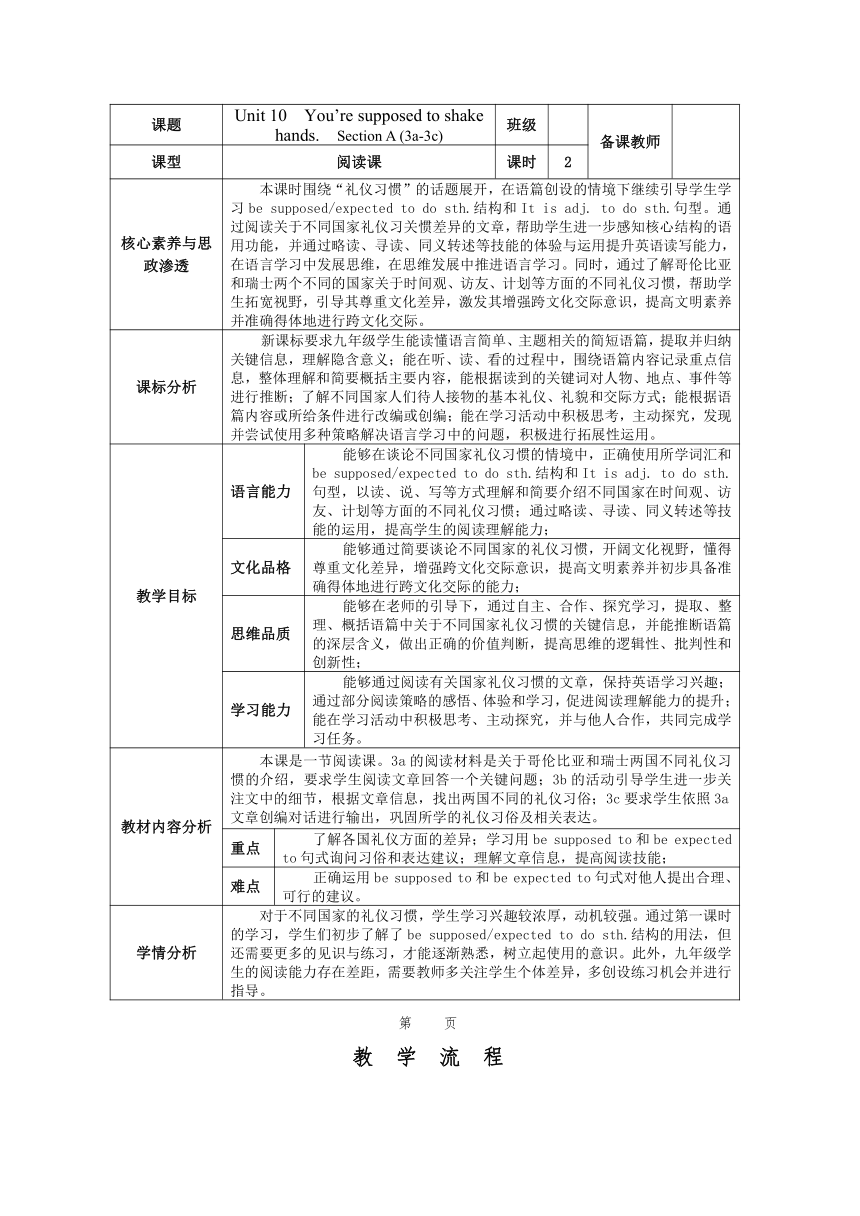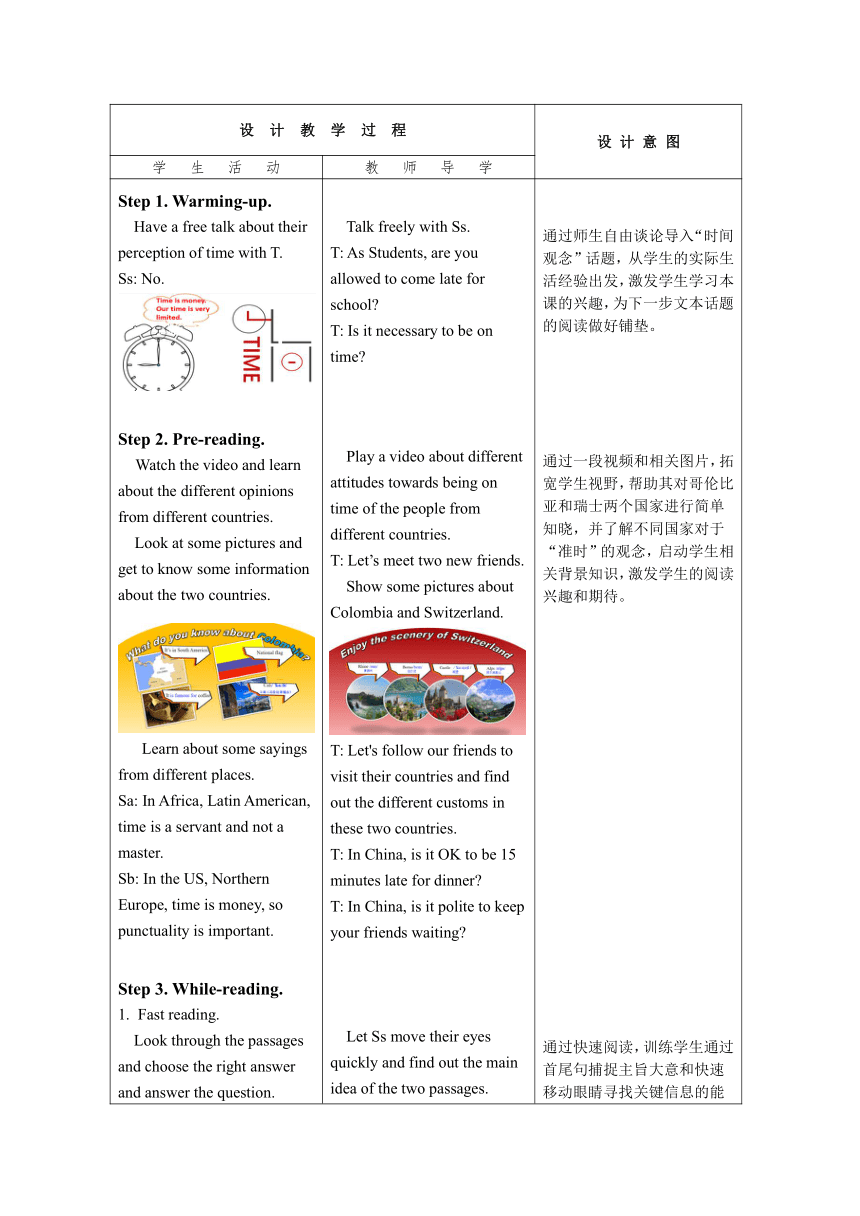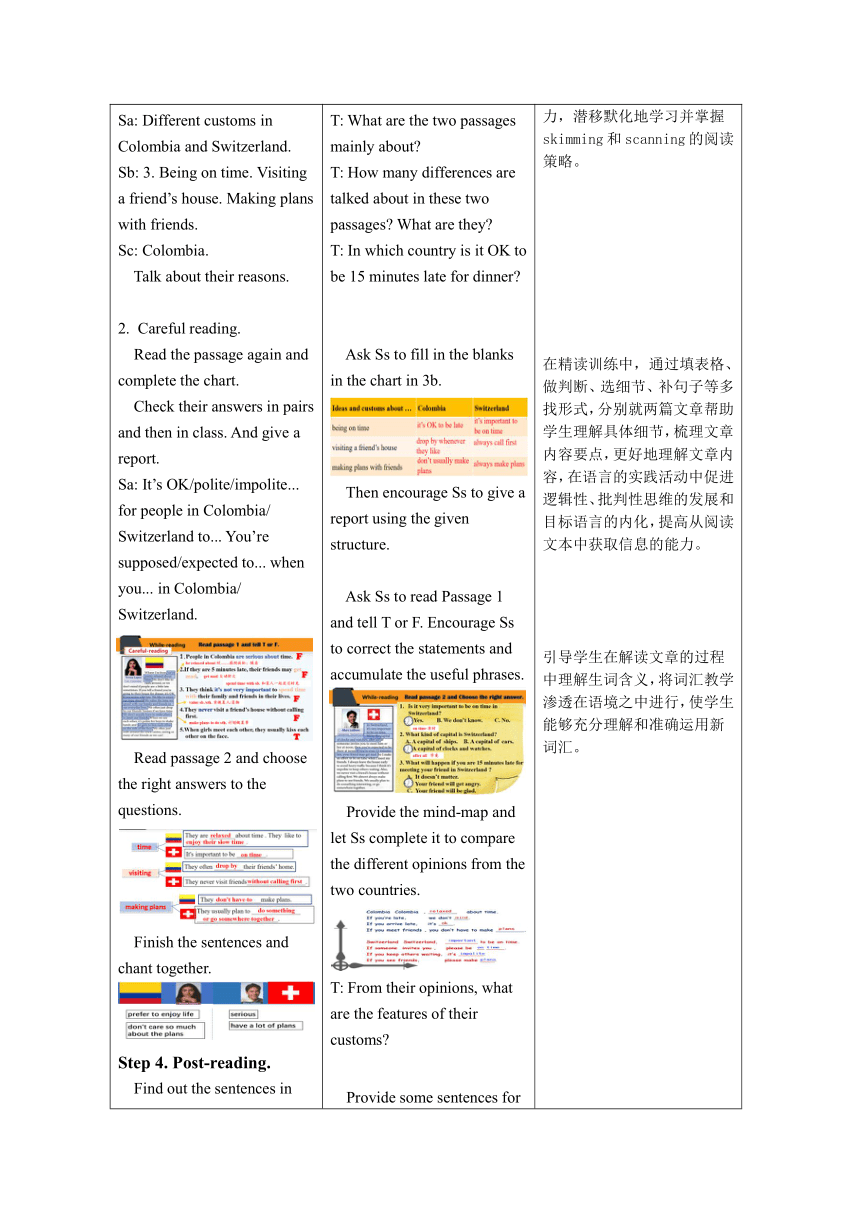【核心素养目标】Unit 10 You’re supposed to shake hands. Section A (3a-3c)表格式教案
文档属性
| 名称 | 【核心素养目标】Unit 10 You’re supposed to shake hands. Section A (3a-3c)表格式教案 |

|
|
| 格式 | docx | ||
| 文件大小 | 1.2MB | ||
| 资源类型 | 教案 | ||
| 版本资源 | 人教新目标(Go for it)版 | ||
| 科目 | 英语 | ||
| 更新时间 | 2024-09-24 00:00:00 | ||
图片预览



文档简介
课题 Unit 10 You’re supposed to shake hands. Section A (3a-3c) 班级 备课教师
课型 阅读课 课时 2
核心素养与思政渗透 本课时围绕“礼仪习惯”的话题展开,在语篇创设的情境下继续引导学生学习be supposed/expected to do sth.结构和It is adj. to do sth.句型。通过阅读关于不同国家礼仪习关惯差异的文章,帮助学生进一步感知核心结构的语用功能,并通过略读、寻读、同义转述等技能的体验与运用提升英语读写能力,在语言学习中发展思维,在思维发展中推进语言学习。同时,通过了解哥伦比亚和瑞士两个不同的国家关于时间观、访友、计划等方面的不同礼仪习惯,帮助学生拓宽视野,引导其尊重文化差异,激发其增强跨文化交际意识,提高文明素养并准确得体地进行跨文化交际。
课标分析 新课标要求九年级学生能读懂语言简单、主题相关的简短语篇,提取并归纳关键信息,理解隐含意义;能在听、读、看的过程中,围绕语篇内容记录重点信息,整体理解和简要概括主要内容,能根据读到的关键词对人物、地点、事件等进行推断;了解不同国家人们待人接物的基本礼仪、礼貌和交际方式;能根据语篇内容或所给条件进行改编或创编;能在学习活动中积极思考,主动探究,发现并尝试使用多种策略解决语言学习中的问题,积极进行拓展性运用。
教学目标 语言能力 能够在谈论不同国家礼仪习惯的情境中,正确使用所学词汇和be supposed/expected to do sth.结构和It is adj. to do sth.句型,以读、说、写等方式理解和简要介绍不同国家在时间观、访友、计划等方面的不同礼仪习惯;通过略读、寻读、同义转述等技能的运用,提高学生的阅读理解能力;
文化品格 能够通过简要谈论不同国家的礼仪习惯,开阔文化视野,懂得尊重文化差异,增强跨文化交际意识,提高文明素养并初步具备准确得体地进行跨文化交际的能力;
思维品质 能够在老师的引导下,通过自主、合作、探究学习,提取、整理、概括语篇中关于不同国家礼仪习惯的关键信息,并能推断语篇的深层含义,做出正确的价值判断,提高思维的逻辑性、批判性和创新性;
学习能力 能够通过阅读有关国家礼仪习惯的文章,保持英语学习兴趣;通过部分阅读策略的感悟、体验和学习,促进阅读理解能力的提升;能在学习活动中积极思考、主动探究,并与他人合作,共同完成学习任务。
教材内容分析 本课是一节阅读课。3a的阅读材料是关于哥伦比亚和瑞士两国不同礼仪习惯的介绍,要求学生阅读文章回答一个关键问题;3b的活动引导学生进一步关注文中的细节,根据文章信息,找出两国不同的礼仪习俗;3c要求学生依照3a文章创编对话进行输出,巩固所学的礼仪习俗及相关表达。
重点 了解各国礼仪方面的差异;学习用be supposed to和be expected to句式询问习俗和表达建议;理解文章信息,提高阅读技能;
难点 正确运用be supposed to和be expected to句式对他人提出合理、可行的建议。
学情分析 对于不同国家的礼仪习惯,学生学习兴趣较浓厚,动机较强。通过第一课时的学习,学生们初步了解了be supposed/expected to do sth.结构的用法,但还需要更多的见识与练习,才能逐渐熟悉,树立起使用的意识。此外,九年级学生的阅读能力存在差距,需要教师多关注学生个体差异,多创设练习机会并进行指导。
第 页
教 学 流 程
设 计 教 学 过 程 设 计 意 图
学 生 活 动 教 师 导 学
Step 1. Warming-up. Have a free talk about their perception of time with T. Ss: No. Step 2. Pre-reading. Watch the video and learn about the different opinions from different countries. Look at some pictures and get to know some information about the two countries. Learn about some sayings from different places. Sa: In Africa, Latin American, time is a servant and not a master. Sb: In the US, Northern Europe, time is money, so punctuality is important. Step 3. While-reading. Fast reading. Look through the passages and choose the right answer and answer the question. Sa: Different customs in Colombia and Switzerland. Sb: 3. Being on time. Visiting a friend’s house. Making plans with friends. Sc: Colombia. Talk about their reasons. Careful reading. Read the passage again and complete the chart. Check their answers in pairs and then in class. And give a report. Sa: It’s OK/polite/impolite... for people in Colombia/ Switzerland to... You’re supposed/expected to... when you... in Colombia/ Switzerland. Read passage 2 and choose the right answers to the questions. Finish the sentences and chant together. Step 4. Post-reading. Find out the sentences in the passage that have the same meanings as the given sentences. Make new conversations in pairs. Share their opinions in class and explain their reasons. The target language should be used. Work in groups and discuss the importance of being on time. Try to follow the structure of the topic, the reason and the conclusion. Work in groups and collect ideas about the customs. Then share their opinions in class. Step 5. Conclusion. Try to have a summary about what they have learnt this lesson. Talk freely with Ss. T: As Students, are you allowed to come late for school T: Is it necessary to be on time Play a video about different attitudes towards being on time of the people from different countries. T: Let’s meet two new friends. Show some pictures about Colombia and Switzerland. T: Let's follow our friends to visit their countries and find out the different customs in these two countries. T: In China, is it OK to be 15 minutes late for dinner T: In China, is it polite to keep your friends waiting Let Ss move their eyes quickly and find out the main idea of the two passages. T: What are the two passages mainly about T: How many differences are talked about in these two passages What are they T: In which country is it OK to be 15 minutes late for dinner Ask Ss to fill in the blanks in the chart in 3b. Then encourage Ss to give a report using the given structure. Ask Ss to read Passage 1 and tell T or F. Encourage Ss to correct the statements and accumulate the useful phrases. Provide the mind-map and let Ss complete it to compare the different opinions from the two countries. T: From their opinions, what are the features of their customs Provide some sentences for Ss to paraphrase. e.g. We don’t care much about time and we are quite casual. = We’re pretty relaxed about time. Ask Ss to role-play a conversation between Teresa and Marc. Suppose Teresa is late and Marc is mad. T: If you are invited to travel to one of the two countries, which one would you choose Let Ss work with their group members and have a discussion about their own opinions on whether it is important to be on time. Several minutes later, invite some Ss to give a report about the results. Let Ss say something about customs in China about being on time, visiting friends and making plans with friends in each groups. 通过师生自由谈论导入“时间观念”话题,从学生的实际生活经验出发,激发学生学习本课的兴趣,为下一步文本话题的阅读做好铺垫。 通过一段视频和相关图片,拓宽学生视野,帮助其对哥伦比亚和瑞士两个国家进行简单知晓,并了解不同国家对于“准时”的观念,启动学生相关背景知识,激发学生的阅读兴趣和期待。 通过快速阅读,训练学生通过首尾句捕捉主旨大意和快速移动眼睛寻找关键信息的能力,潜移默化地学习并掌握skimming和scanning的阅读策略。 在精读训练中,通过填表格、做判断、选细节、补句子等多找形式,分别就两篇文章帮助学生理解具体细节,梳理文章内容要点,更好地理解文章内容,在语言的实践活动中促进逻辑性、批判性思维的发展和目标语言的内化,提高从阅读文本中获取信息的能力。 引导学生在解读文章的过程中理解生词含义,将词汇教学渗透在语境之中进行,使学生能够充分理解和准确运用新词汇。 通过让学生在文中寻找同义句,帮助其巩固语言基础,丰富表达方式,为后面的写作打好基础。 通过同伴角色扮演的形式,引导学生将所学语言联系文中主人公所在的国家礼仪习俗背景加以迁移运用,充分理解并运用目标语言,增强跨文化交际意识,提高辩证思维和创新思维的能力。 通过小组交流合作,培养学生的合作学习意识,引导其将文本所学联系我国礼仪习惯进行迁移运用,讲好中国故事,弘扬家国情怀,坚定文化自信。
第 页
课 时 达 标 检 测
Ⅰ.根据句意及汉语提示完成句子。 —It's twelve at (中午). What about having lunch together —Good idea. Listening to light music makes me feel (放松的). Mr. Black advises Mrs. Black to (避免) driving in the city center. In my opinion, it's (不礼貌的) of you to shout at the old woman. 5.In the end, my family decided to go (某个地方) warm to spend the holiday. Ⅱ.用所给单词的适当形式填空。 6. He left without (say) a word.Maybe he got annoyed. 7.We should treasure our own (value) art and culture, such as shadow play and paper cutting. 8. It is important (follow) the doctor's advice. 9. My uncle likes to make plans (do) everything. 10. Don't keep others (wait) for you all the time. Ⅲ.用方框中所给单词或短语的适当形式填空,有两个多余项。 get mad, make an effort, capital, suppose, greet, valuable, kiss 11.London is the of the UK. It is a very big and old city. 12.My mother when I broke her favorite glasses. 13.These palaces are very old and have great historical . 14.Everybody should to reduce pollution. 15.You are not to smoke in public places. Ⅳ. 根据汉语意思完成句子。 16.请永远不要放弃! 世界上从来没有人未经努力就取得成功。 Never give up, please! No one in the world has ever succeeded without an . 17.他只是忘了日期——没有什么大不了的! He just forgot the date—it's no ! 18.你应当尽可能地做好。 You should do well you . 19.不要对他生气,毕竟他只是一个孩子。 Don't be angry with him.He is only a child . 20.他昨天顺道到一个美国朋友家拜访。 He an American friend's home yesterday.
第 页
课 时 教 学 设 计 尾 页
板 书 设 计
Unit 10 You’re supposed to shake hands. (Section A 3a-3c)
作 业 设 计
Level A Write a short passage about some customs in China about being on time, visiting friends, making plans with friends and so on.
Level B Draw a mind-map about different customs in the two countries based on the passage.
教 学 反 思
第 页
课型 阅读课 课时 2
核心素养与思政渗透 本课时围绕“礼仪习惯”的话题展开,在语篇创设的情境下继续引导学生学习be supposed/expected to do sth.结构和It is adj. to do sth.句型。通过阅读关于不同国家礼仪习关惯差异的文章,帮助学生进一步感知核心结构的语用功能,并通过略读、寻读、同义转述等技能的体验与运用提升英语读写能力,在语言学习中发展思维,在思维发展中推进语言学习。同时,通过了解哥伦比亚和瑞士两个不同的国家关于时间观、访友、计划等方面的不同礼仪习惯,帮助学生拓宽视野,引导其尊重文化差异,激发其增强跨文化交际意识,提高文明素养并准确得体地进行跨文化交际。
课标分析 新课标要求九年级学生能读懂语言简单、主题相关的简短语篇,提取并归纳关键信息,理解隐含意义;能在听、读、看的过程中,围绕语篇内容记录重点信息,整体理解和简要概括主要内容,能根据读到的关键词对人物、地点、事件等进行推断;了解不同国家人们待人接物的基本礼仪、礼貌和交际方式;能根据语篇内容或所给条件进行改编或创编;能在学习活动中积极思考,主动探究,发现并尝试使用多种策略解决语言学习中的问题,积极进行拓展性运用。
教学目标 语言能力 能够在谈论不同国家礼仪习惯的情境中,正确使用所学词汇和be supposed/expected to do sth.结构和It is adj. to do sth.句型,以读、说、写等方式理解和简要介绍不同国家在时间观、访友、计划等方面的不同礼仪习惯;通过略读、寻读、同义转述等技能的运用,提高学生的阅读理解能力;
文化品格 能够通过简要谈论不同国家的礼仪习惯,开阔文化视野,懂得尊重文化差异,增强跨文化交际意识,提高文明素养并初步具备准确得体地进行跨文化交际的能力;
思维品质 能够在老师的引导下,通过自主、合作、探究学习,提取、整理、概括语篇中关于不同国家礼仪习惯的关键信息,并能推断语篇的深层含义,做出正确的价值判断,提高思维的逻辑性、批判性和创新性;
学习能力 能够通过阅读有关国家礼仪习惯的文章,保持英语学习兴趣;通过部分阅读策略的感悟、体验和学习,促进阅读理解能力的提升;能在学习活动中积极思考、主动探究,并与他人合作,共同完成学习任务。
教材内容分析 本课是一节阅读课。3a的阅读材料是关于哥伦比亚和瑞士两国不同礼仪习惯的介绍,要求学生阅读文章回答一个关键问题;3b的活动引导学生进一步关注文中的细节,根据文章信息,找出两国不同的礼仪习俗;3c要求学生依照3a文章创编对话进行输出,巩固所学的礼仪习俗及相关表达。
重点 了解各国礼仪方面的差异;学习用be supposed to和be expected to句式询问习俗和表达建议;理解文章信息,提高阅读技能;
难点 正确运用be supposed to和be expected to句式对他人提出合理、可行的建议。
学情分析 对于不同国家的礼仪习惯,学生学习兴趣较浓厚,动机较强。通过第一课时的学习,学生们初步了解了be supposed/expected to do sth.结构的用法,但还需要更多的见识与练习,才能逐渐熟悉,树立起使用的意识。此外,九年级学生的阅读能力存在差距,需要教师多关注学生个体差异,多创设练习机会并进行指导。
第 页
教 学 流 程
设 计 教 学 过 程 设 计 意 图
学 生 活 动 教 师 导 学
Step 1. Warming-up. Have a free talk about their perception of time with T. Ss: No. Step 2. Pre-reading. Watch the video and learn about the different opinions from different countries. Look at some pictures and get to know some information about the two countries. Learn about some sayings from different places. Sa: In Africa, Latin American, time is a servant and not a master. Sb: In the US, Northern Europe, time is money, so punctuality is important. Step 3. While-reading. Fast reading. Look through the passages and choose the right answer and answer the question. Sa: Different customs in Colombia and Switzerland. Sb: 3. Being on time. Visiting a friend’s house. Making plans with friends. Sc: Colombia. Talk about their reasons. Careful reading. Read the passage again and complete the chart. Check their answers in pairs and then in class. And give a report. Sa: It’s OK/polite/impolite... for people in Colombia/ Switzerland to... You’re supposed/expected to... when you... in Colombia/ Switzerland. Read passage 2 and choose the right answers to the questions. Finish the sentences and chant together. Step 4. Post-reading. Find out the sentences in the passage that have the same meanings as the given sentences. Make new conversations in pairs. Share their opinions in class and explain their reasons. The target language should be used. Work in groups and discuss the importance of being on time. Try to follow the structure of the topic, the reason and the conclusion. Work in groups and collect ideas about the customs. Then share their opinions in class. Step 5. Conclusion. Try to have a summary about what they have learnt this lesson. Talk freely with Ss. T: As Students, are you allowed to come late for school T: Is it necessary to be on time Play a video about different attitudes towards being on time of the people from different countries. T: Let’s meet two new friends. Show some pictures about Colombia and Switzerland. T: Let's follow our friends to visit their countries and find out the different customs in these two countries. T: In China, is it OK to be 15 minutes late for dinner T: In China, is it polite to keep your friends waiting Let Ss move their eyes quickly and find out the main idea of the two passages. T: What are the two passages mainly about T: How many differences are talked about in these two passages What are they T: In which country is it OK to be 15 minutes late for dinner Ask Ss to fill in the blanks in the chart in 3b. Then encourage Ss to give a report using the given structure. Ask Ss to read Passage 1 and tell T or F. Encourage Ss to correct the statements and accumulate the useful phrases. Provide the mind-map and let Ss complete it to compare the different opinions from the two countries. T: From their opinions, what are the features of their customs Provide some sentences for Ss to paraphrase. e.g. We don’t care much about time and we are quite casual. = We’re pretty relaxed about time. Ask Ss to role-play a conversation between Teresa and Marc. Suppose Teresa is late and Marc is mad. T: If you are invited to travel to one of the two countries, which one would you choose Let Ss work with their group members and have a discussion about their own opinions on whether it is important to be on time. Several minutes later, invite some Ss to give a report about the results. Let Ss say something about customs in China about being on time, visiting friends and making plans with friends in each groups. 通过师生自由谈论导入“时间观念”话题,从学生的实际生活经验出发,激发学生学习本课的兴趣,为下一步文本话题的阅读做好铺垫。 通过一段视频和相关图片,拓宽学生视野,帮助其对哥伦比亚和瑞士两个国家进行简单知晓,并了解不同国家对于“准时”的观念,启动学生相关背景知识,激发学生的阅读兴趣和期待。 通过快速阅读,训练学生通过首尾句捕捉主旨大意和快速移动眼睛寻找关键信息的能力,潜移默化地学习并掌握skimming和scanning的阅读策略。 在精读训练中,通过填表格、做判断、选细节、补句子等多找形式,分别就两篇文章帮助学生理解具体细节,梳理文章内容要点,更好地理解文章内容,在语言的实践活动中促进逻辑性、批判性思维的发展和目标语言的内化,提高从阅读文本中获取信息的能力。 引导学生在解读文章的过程中理解生词含义,将词汇教学渗透在语境之中进行,使学生能够充分理解和准确运用新词汇。 通过让学生在文中寻找同义句,帮助其巩固语言基础,丰富表达方式,为后面的写作打好基础。 通过同伴角色扮演的形式,引导学生将所学语言联系文中主人公所在的国家礼仪习俗背景加以迁移运用,充分理解并运用目标语言,增强跨文化交际意识,提高辩证思维和创新思维的能力。 通过小组交流合作,培养学生的合作学习意识,引导其将文本所学联系我国礼仪习惯进行迁移运用,讲好中国故事,弘扬家国情怀,坚定文化自信。
第 页
课 时 达 标 检 测
Ⅰ.根据句意及汉语提示完成句子。 —It's twelve at (中午). What about having lunch together —Good idea. Listening to light music makes me feel (放松的). Mr. Black advises Mrs. Black to (避免) driving in the city center. In my opinion, it's (不礼貌的) of you to shout at the old woman. 5.In the end, my family decided to go (某个地方) warm to spend the holiday. Ⅱ.用所给单词的适当形式填空。 6. He left without (say) a word.Maybe he got annoyed. 7.We should treasure our own (value) art and culture, such as shadow play and paper cutting. 8. It is important (follow) the doctor's advice. 9. My uncle likes to make plans (do) everything. 10. Don't keep others (wait) for you all the time. Ⅲ.用方框中所给单词或短语的适当形式填空,有两个多余项。 get mad, make an effort, capital, suppose, greet, valuable, kiss 11.London is the of the UK. It is a very big and old city. 12.My mother when I broke her favorite glasses. 13.These palaces are very old and have great historical . 14.Everybody should to reduce pollution. 15.You are not to smoke in public places. Ⅳ. 根据汉语意思完成句子。 16.请永远不要放弃! 世界上从来没有人未经努力就取得成功。 Never give up, please! No one in the world has ever succeeded without an . 17.他只是忘了日期——没有什么大不了的! He just forgot the date—it's no ! 18.你应当尽可能地做好。 You should do well you . 19.不要对他生气,毕竟他只是一个孩子。 Don't be angry with him.He is only a child . 20.他昨天顺道到一个美国朋友家拜访。 He an American friend's home yesterday.
第 页
课 时 教 学 设 计 尾 页
板 书 设 计
Unit 10 You’re supposed to shake hands. (Section A 3a-3c)
作 业 设 计
Level A Write a short passage about some customs in China about being on time, visiting friends, making plans with friends and so on.
Level B Draw a mind-map about different customs in the two countries based on the passage.
教 学 反 思
第 页
同课章节目录
- Unit 1 How can we become good learners.
- Section A
- Section B
- Unit 2 I think that mooncakes are delicious!
- Section A
- Section B
- Unit 3 Could you please tell me where the restroom
- Section A
- Section B
- Unit 4 I used to be afraid of the dark.
- Section A
- Section B
- Unit 5 What are the shirts made of?
- Section A
- Section B
- Review of Units 1-5
- Unit 6 When was it invented?
- Section A
- Section B
- Unit 7 Teenagers should be allowed to choose their
- Section A
- Section B
- Unit 8 It must belong to Carla.
- Section A
- Section B
- Unit 9 I like music that I can dance to.
- Section A
- Section B
- Unit 10 You're supposed to shake hands.
- Section A
- Section B
- Review of Units 6-10
- Unit 11 Sad movies make me cry.
- Section A
- Section B
- Unit 12 Life is full of the unexpected
- Section A
- Section B
- Unit 13 We're trying to save the earth!
- Section A
- Section B
- Unit 14 I remember meeting all of you in Grade 7.
- Section A
- Section B
- Review of Units 11-14
